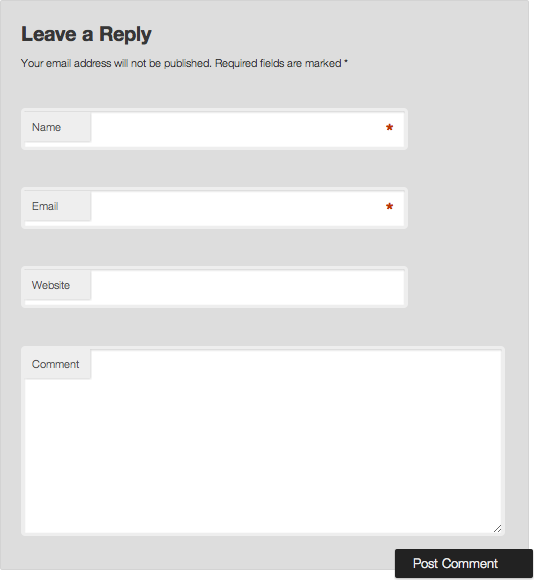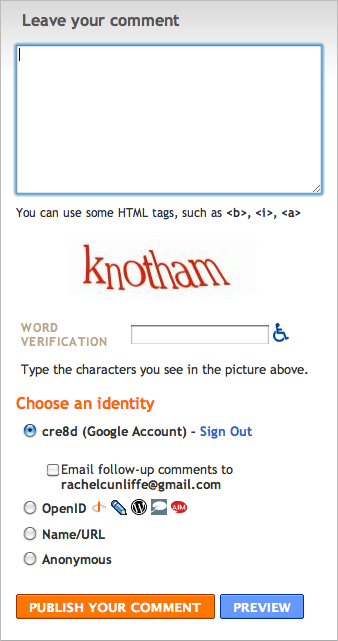As an experiment, I’ve switched my commenting over to Facebook’s commenting system (for a little while at least). Apologies to those of you (cough Bene Diction, Chris Heaslip) who don’t have a Facebook account.
Like Facebook or loathe it (I can’t decide), the social networking giant has had a huge impact on blog comments, primarily:
A decrease in the number of blog comments
I regularly hear from bloggers who are concerned about the low number of comments they get on their blog, compared to a while ago. They note that more conversation is happening on Facebook but would prefer it to happen “out in the open” on their blog and on their site.
I think there’s a few reasons for the shift:
Facebook is so much easier to comment on than most blogs
How much simpler can a comment box be than this?
![]()
By making that the most common commenting experience people are now having online, anything else looks rather a lot of work and requires learning a new way of adding a comment. Compare the Facebook experience to WordPress (top image) or Blogger (bottom image):


Granted, creating an account and logging in reduces the comment form complexity in WordPress, but if you’re like many of us, you’re already logged into Facebook for purposes other than to comment.
Facebook has mastered the art of easy commenting.
Facebook is more personal
In Facebook, you’re commenting on a friend or page’s status update or photo etc. You know the types of people who are reading it and will also be commenting. You recognize their photos – which pretty much everyone has, unlike Gravatars used on many blogs. You can see their real* names. In many cases, you closely know the person you’re commenting with as well.
On blogs, unless you’re a regular commenter, or reader of the blog’s comments, you’re not so likely to know the other people commenting and you can get into debates with people who you’ll have no idea as to who their identity is. This can be a good or a bad thing – but by and large, requiring commenters to use their real* name and photo attached to their thoughts reduces the likelihood of the nasty and unwanted comment varieties.
(Probably not as important, but different to most blogs, if you make a mistake you can edit or delete your comment on Facebook.)
A preference for clicking “like”
Facebook’s “like” button has replaced a certain type of comment and reduced other kinds of comment. Instead of spending a few moments to write a thank you note, or insight into why one appreciated a post, clicking “like” is much faster and much easier. For some sites, “likes” reduce the clutter of endless repetitive comments, but for others, the richness of a full thank you note is lost.
An overexposure to soliciting for comments
Now that every site (not just blogs) are wanting your comments, your feedback, your interaction, it can get a bit overwhelming and tiresome to comment on everything you read. When blogs began, their commenting functionality really opened up communication channels and was revolutionary. Not anymore.
So what can bloggers do to get more people commenting? Here’s some ideas.
Reassess your commenters’ experience
Think hard about the commenting system you’re using (WordPress’ default, Disqus, Intense Debate, Facebook comments etc) and whether it provides an easy user experience in the way you have it set up. Keep an eye on new features but check that you’re not complicating things for commenters.
No one wants to be first
Being the first commenter on a blog post seems to take more courage, more effort. Perhaps try getting a few friends to comment on your blogs with an insightful comment to help get things going. Also, the first few comments can really set the tone of the discussion – it can start off on the wrong foot very easily. You set the tone for your blog content, consider the type of conversations you want to encourage and discourage in your comments. Do you want constructive discussions, allow petty ones, fierce debate etc?
No one likes their comments ignored
I love it when I see responses from the author to comments on their blog, and it makes me want to comment there again. This is even more so the case when I have spent a lot of time writing a comment. It’s disheartening to feel ignored. What’s more, the bigger the blog, the more meaningful the blog owner’s direct responses to you can be. When was the last time you responded to the majority of comments on your blog for a day or a week?
Get actionable tips to grow your website
Thoughtful weekly insights (no hype!) on improving your website